Dealing With The Ever-Increasing Prevalence Of Cyber-Harassment Against Women (Women's Day Special Article)
Women have been long forced to deal with harassment in their daily lives, but it has become all the more prevalent when you look at how they are treated on social media platforms. Its necessary to provide a worldwide, digital support system for women to turn to when they experience online abuse, trolling and cyberstalking. We will also be conducting campaigns through our platform using high-profile members of the community to help raise awareness about online sexism and misogyny and how it manifests in the media.

Copyrighted to @tanzim2
Introduction
The Internet is a fantastic place where people from all over the world have equal access to information, commerce and entertainment. In addition, social media was created to build communities among like-minded individuals who share similar interests and experiences. The biggest issue we face with the internet today is that it can be used as a weapon to harass women through tactics that range from blackmail and bullying to rape threats.
In this post, we will explore how to combat cyber-harassment by looking at what it is, where we find it today, why women are so effected by these messages and images across social media platforms, and finally some tips for building up a resistance to these messages.
Cyberbullying
The National Crime Prevention Council (US) reports a few examples of Cyberbullying:
Teasing on Social Media Platforms
Posting Defamatory Material Online
Posting Secret Videos Online
Posting Threatening or Self-Injurious Content Online
Impersonating another User Online
Posting Hate Speech Online
Posting Personal and Confidential Information Online
Sending Other Users Sexual, Scandalous, and Threatening Communications Online
Sending Other Users Personal Information Annoyance
Instigating Violence Online
Posting Untended Images of a Sexual Nature Online
Using Social Media to Gather Personal Information or Contacts Online
Engaging in Cyber Bullying
Cyberbullying has been shown to have negative effects on both victims and perpetrators. Some of these effects are cognitive, emotional and behavioural and others are physical or health-related.
Victims and After Effects
Female victims of violence and abuse on the internet are disproportionately targeted in an era where internet access is being used to promote social equality. Abuse victims are unable to participate in society as a result of this type of treatment. It's a common occurrence that goes unnoticed by the vast majority of individuals. Cyberstalking and other forms of sexual and gender-based harassment on the internet are on the rise, and campaigners claim that present laws are insufficient to safeguard users. Though new bills have been introduced to combat harassment, they’re still being met with resistance.
For a long time, cyberstalking and other forms of harassment were largely seen as less than serious crimes because they are "considered minor annoyances." This view has recently changed, though it is often still in opposition to the traditional gender norms that still persist today. The crux of this problem lies in the idea that if the victim is harassed through words or actions, and not subjected to physical harm, then it isn't deemed a "real" crime. Online harassment, doxxing, cyberstalking, threats, revenge porn, sex trafficking, and a number of other forms of exploitation can come to women and girls every time they use a computer or mobile phone to connect with the internet.
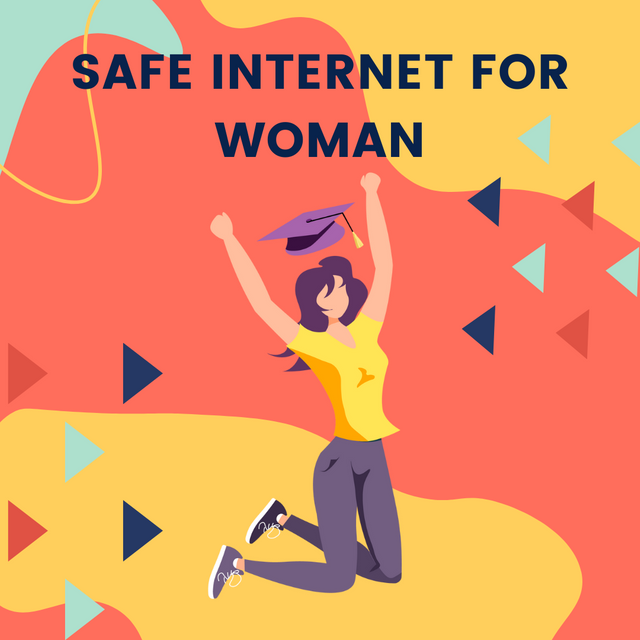
Copyrighted to @tanzim2
A study by Pew Research Center finds that “cyber harassment is most common among young women between the ages of 18 and 24 who use social media sites.” This finding is not surprising, given that with the rising prominence of social media as many people’s main form of communication, cyber-harassment or online sexual abuse toward women has been on the rise.
The reason why cyberstalking and other forms of sexual and gender-based harassment on the internet are on the rise is simply because it's a form of abuse against women who are unable to participate in society without facing such abuse at their own hands. It's a common occurrence that goes unnoticed by the vast majority of individuals.
Even though addressing the underlying causes of gender-based violence is the first step in preventing online abuse, there are additional precautions that women and girls can take to protect themselves online. All women should know basic online safety and security tips to reduce the risk of becoming a victim of harassment.
Recent national and international events have highlighted the need for effective prevention strategies, as well as policies to defend victims of these crimes. The role of Government, civil society and the private sector is key to raising awareness and developing action plans, as well as in implementing these frameworks.
The Very First Step to protect….
The first step in combatting cyber harassment and abuse is empowering girls and women with information. Educating girls about how to use the internet without putting themselves at risk, having discussions with family members about how women in general are treated online, and making sure that your children know that it is unacceptable to harass someone else online are all simple measures that can be taken by both parents and teachers. The law plays an important role in creating a clear message that this type of abuse is not acceptable. Governments can pass laws that make it illegal to send an unwanted and offensive message or to distribute private images without permission. In order to catch the perpetrators of these crimes, laws can also allow government officials to be able to monitor computer activity, giving them access to the content of communications and internet activity.
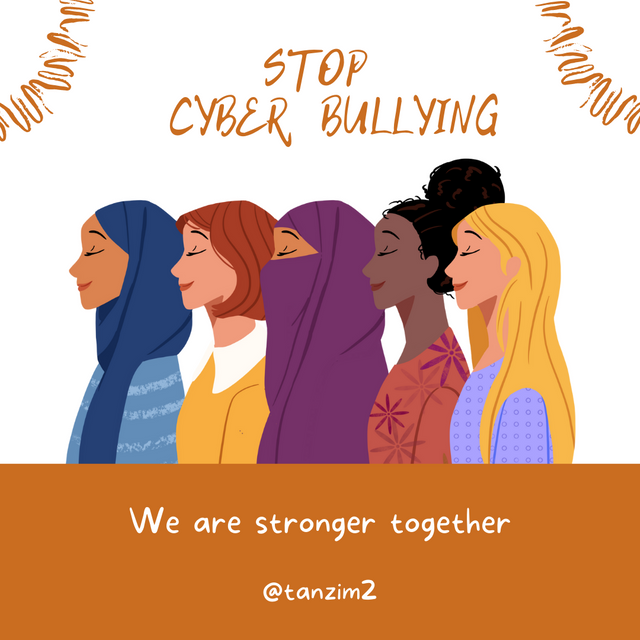
Copyrighted to @tanzim2
The women's rights organization Equality Now has been working on the issue of cyber-harassment for over 15 years. The organization has done extensive research on this issue and published a manual for police and lawmakers based on their research about how to tackle online sexual harassment.
Tips for Avoiding Cyberstalking and Online Harassment
In addition to these specific online safety measures, all women should understand that increased visibility in social spaces may increase their risk of being targeted for abuse or harassment. As such, women should be cautious whenever they post information about themselves or their activities. In addition, they should also familiarize themselves with safety measures that platforms like Facebook and Twitter provide. Women should know that they are not obligated to disclose any information about themselves and their activities.
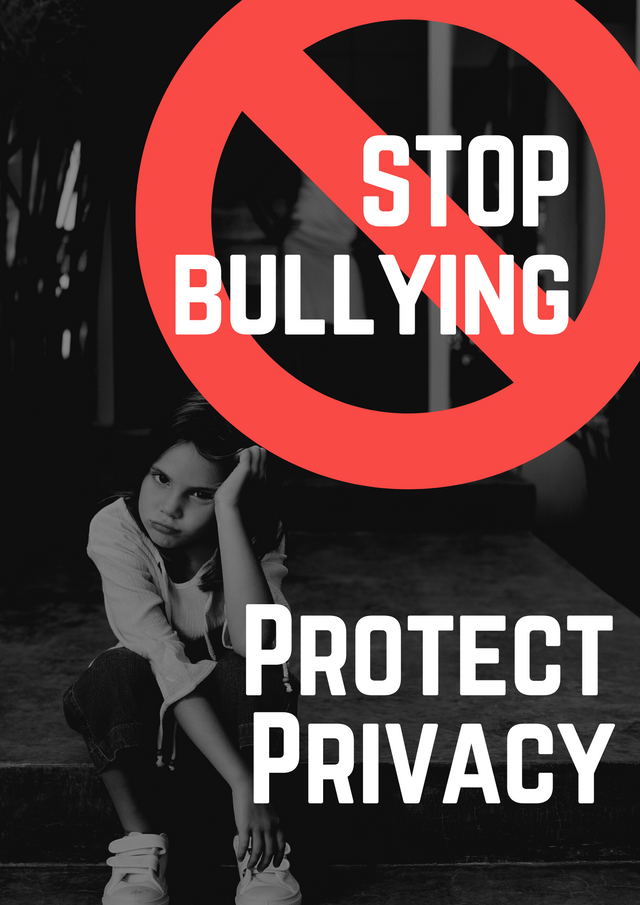
Copyrighted to @tanzim2
Here are few additional tips:
1. Make Sure You're Protected and Anonymous While Browsing the Internet
A number of measures can be taken to limit the amount of personal data and activity that is gathered and shared by online abusers. One of the most important things is to make sure that you are using adequate privacy and security software. You should also be careful when deciding to post personal information on social media, and make sure your privacy settings are set to the highest level.
2. Know How To Request Removal Of Illegal Content Online
Many social media sites have regulations and policies in place that allow users to file reports against illegal or unwanted content. Some of these regulations include the removal of any graphic material depicting rape or homicide, while others allow for the removal of defamatory remarks made by others on their page or otherwise. You can also report issues of online harassment to the social media outlets in question as well.
3. Ensure That You Are Not Victim Of Impersonation or Identity Theft
If you ever find out that others have been using your personal information, you should contact its respective service provider and inform them of the issue. In some cases, identity theft may even be a more serious crime than the harassment itself if it involves financial fraud or other crimes.
4. Report Illegal Activity To Social Media Platforms and Other Online Services
If you ever find out about illegal activity on your social media account, or through the service in question, it is important that you report these incidents immediately to the relevant authorities. For example, if another online user is using your personal information to send harassing messages, these can be reported directly to the authorities who can seek out those responsible. Likewise, if other users are using your social media profile as a means of gathering information against you or others while they engage in illegal activities themselves, these crimes can be reported as well.
5. Reach Out To Family, Friends, and Coworkers
If you are being harassed or cyberbullied by others, it is important that you talk to someone about this as soon as possible. It is important to have someone you can turn to when you need help or want to discuss your problems with other users online. You can also seek out additional support from family members and friends, who will be there for you in between sessions of online communication.
6. Be Cautious When Revealing Your Personal Information Online
You need to cautious While applying basic privacy settings for your social media accounts may seem like a sufficient method of protection against online harassment, it is important that you never share any information about yourself that may be used against your interests. If you are seen as an interesting target by online harassers, then this could lead to a scenario where users conduct research into your personal and professional life. Even the most seemingly innocuous details about a person can provide sufficient information for an online acquaintance to do look into you and learn about your secrets and past. The more information that is revealed about yourself online, the easier it will be for others to gain access to this personal data.
7. Stay Updated On Current Events
While it may seem like a good idea for social media users to remain updated on current events and trending news, the constant flow of new stories can lead to increased stress and anxiety levels in some people. Because social media users are often bombarded with a constant stream of texts, updates, and notifications from the services they use, it is easy for these updates to start piling up. This can lead to increased levels of stress and anxiety in some users which may lead them to be more easily affected by cyberbullying tactics.
8. Learn To Cope With Stress From Online Harassment
While stress levels can increase due to the influx of information that is often published on social media sites, users also need to learn how to cope with these stresses themselves. For example, you will want to find ways to shed some light on any issues that are particularly troubling you. Sometimes simply speaking to someone you trust about your trouble can go a long way, while other users may find solace in reading a book or engaging in physical exercise.
9. Know How To Report Online Harassment
While most social media companies have stated policies on cyber-bullying and online harassment, it is important to know how to report these issues properly when they occur. For example, Twitter provides an easy reporting system that enables users to report players for offensive messages or inappropriate conduct immediately. Other social media sites almost always require the submission of personal information about yourself before you are able to report an issue to those in charge of maintaining the service.
10. Be Careful What You Post on the Internet
Regardless of the site or platform you use, the Internet can be a dangerous place. You will want to be cautious in what you post online for the rest of your life, just as someone may need to be careful about what they say in person or in a phone conversation. This means that it is important for people to always think twice before sharing anything online that could reveal their personal information or embarrass them in any way.
11. Use Social Media Wisely
While using social media can have many benefits, such as connecting with friends and family members, it is important that you use these services wisely and avoid putting yourself in harm's way. If you are being stalked, harassed, or cyberbullied by others online, it is important that you contact the proper authorities who can help resolve these issues before they escalate into more serious situations. The above tips will help you deal with many of the problems that users face on social media sites. However, it is also important that you develop a strategy to protect yourself and others in the future as well.
12. Make Use of Security Tools When Browsing
Many social media sites make use of privacy settings that you can adjust to protect your personal information. However, it is important that you also employ security tools while browsing the Internet in general. This can help block potentially illegal activities from occurring as well as thwarting any potential cyber-attacks. You should always make sure that your installed security programs are up to date and use a secure network when browsing connected devices or the Internet itself.
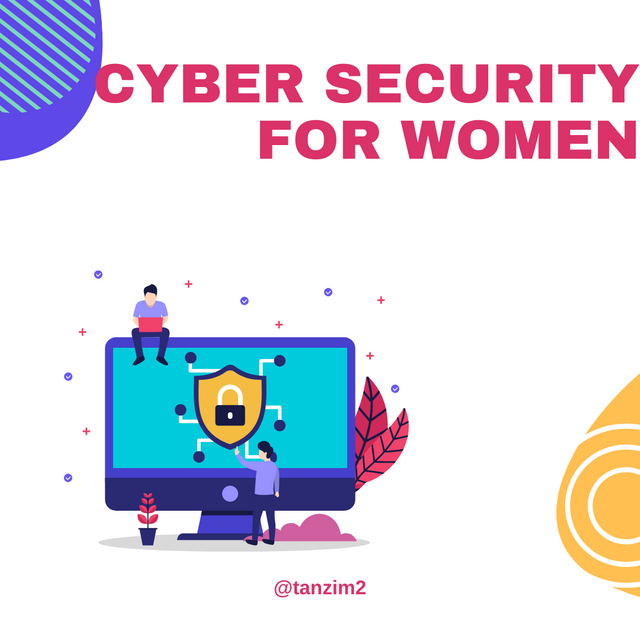
Copyrighted to @tanzim2
13. Be Aware That Hackers May Be Watching
When using social media sites, it is important to be aware of the presence of hackers who may be watching your activity online. If a hacker is able to gain access to your personal information, then he or she may be able to use this information against your interests. This could include stealing your passwords or other data that can be used for identity theft. If you suspect that a hacker may have infiltrated your accounts, you will want to change all of the passwords associated with these accounts as soon as possible.
14. Keep Your Knowledge Current
It is important that social media users keep their knowledge current when it comes to the Internet at large and in particular, social media sites. The best way to do this is to stay abreast of any news stories that may be relevant to cyber-bullying and online harassment. This will help you better identify potential issues as they arise and protect you from suffering the effects of these issues.
15. Women helpline
The fight against cyber aggression has been made easier with the introduction of new laws that allow for more severe punishments for online sexual abuse and harassment.
In 2016, Florida enacted the “Cyber Civil Rights Act” in an effort to stop cyber-harassment against women. The law increased penalties for certain forms of cyber-harassment like revenge porn from a misdemeanour to a felony charge, which carries with it heightened penalties. It also enables victims of cyber-harassment to bring civil lawsuits against the perpetrators, which may be more lucrative than seeking legal action under traditional justice systems.
In 2012, a bill entitled “Aaron’s Law” was introduced in California that allows for a civil suit to be brought against convicted offenders of cyber-harassment. The law also made it easier for victims of online abuse to get access to information on the identity of their attackers and perpetrators, making it much easier for victims to pursue legal action.
Conclusion
Cyber-bullying and online harassment pose a serious threat to anyone who dares to use the Internet as a means of communication or entertainment. Many users already consider this a problem, but with the recent high-profile cases that have been reported, it is clear that more action needs to be taken.
These high profile cases have sparked outrage across the country, prompting legislative actions by state and federal legislators alike. Some law enforcement officials are even interested in creating an anti-cyberbullying task force that can operate across state boundaries and potentially lead to improved investigative abilities when dealing with these types of crimes. It is also likely that in the future, there will be more pressure on social media sites to improve their security measures and hold users accountable for the content that they post online.
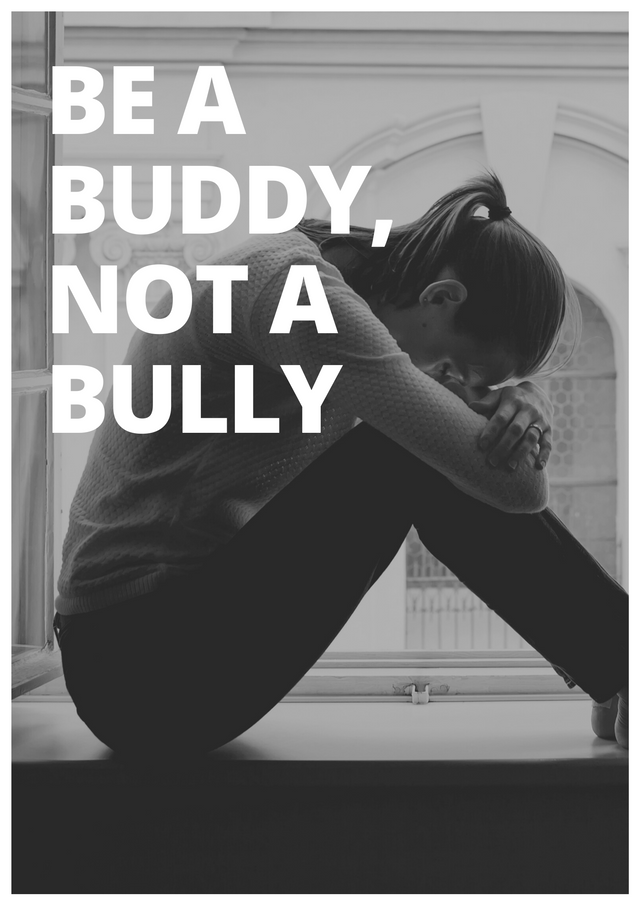
Copyrighted to @tanzim2
In the meantime, it is important for users to work together to ensure that their comments and actions remain appropriate at all times. Treat others as you would like to be treated, and you should have no trouble getting along with most people. Use proper security measures when browsing online as well, making use of certain tools such as antivirus programs and firewalls to protect yourself in the event of a cyber-attack.
References:
- https://givingcompass.org/article/women-and-girls-deserve-safety-online-and-offline
- https://www.pr.com/press-release/611355
- https://www.chaudharyhospital.in/how-to-select-the-best-physician-for-your-medical-treatment
- https://www.independent.co.uk/voices/comment/the-internet-can-be-a-dangerous-place-for-a-depressed-teenager-and-the-law-must-reflect-that-9672692.html
- https://www.burster.com/en/the-company/data-privacy-statement
- https://www.01com.com/newsletter/jul21/letter02.html
- http://web.archive.org/web/20200927191717/https://patientworthy.com/2019/07/22/increased-focus-womens-healthcare-needs-pros-cons-multiple-sclerosis-ms
- https://www.thedailystar.net/bytes/tech-tips/news/dealing-ever-growing-cyber-harassment-against-women-2156276
- https://www.globalcitizen.org/en/content/tips-to-help-women-girls-stay-safe-online/
Nice & qualityful post. You have shared a lot of informations.
thanks for your feedback
Your post has been supported by @tarpan using @steemcurator07 account.
Thank you for making a post in the #Science/ #Computing/ #Technology category. We appreciate the work you have put into this post.
We have analyzed your post and come up with the following conclusion:
Follow @steemitblog for all the latest update.